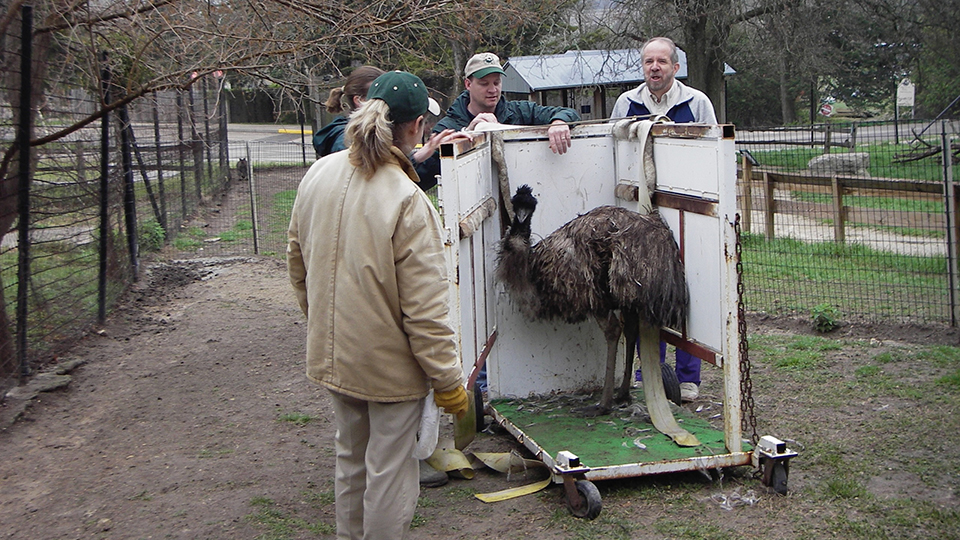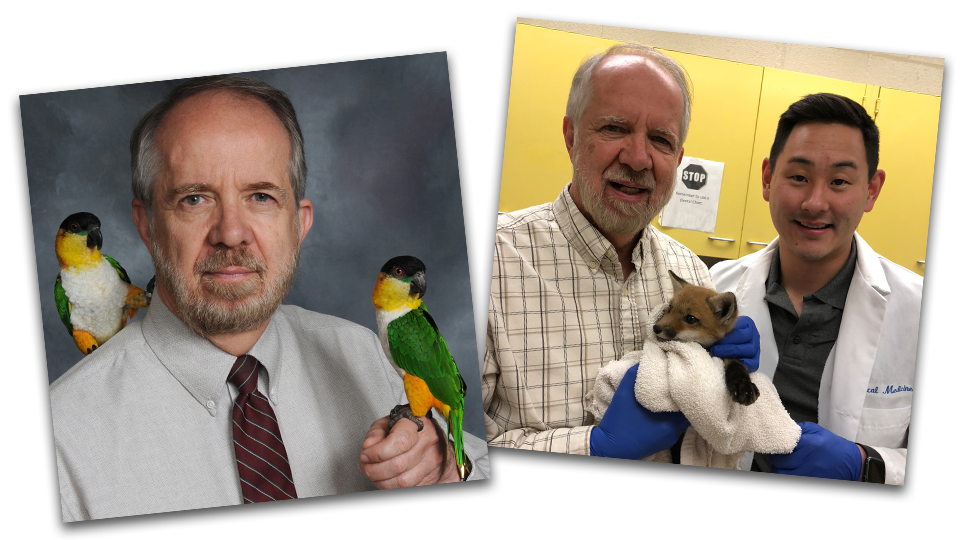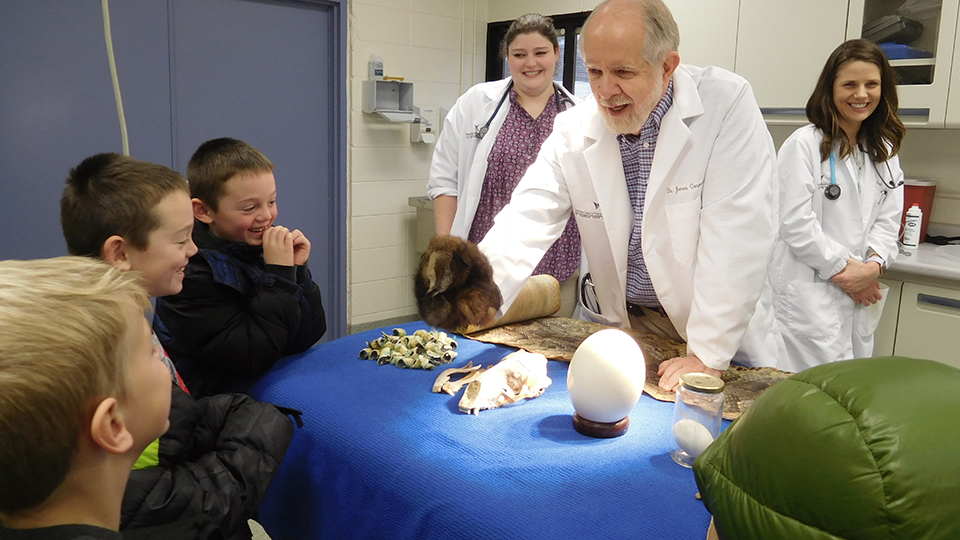K-State partnership with Sunset Zoo benefits veterinary students and animals
As you stroll down the walking path at Sunset Zoo in Manhattan, Kansas, stop at the
top of the hill near the entrance, take a peek through the foliage, and you might
spot a cheetah or two, curled up in the sunshine.
A napping cheetah may look like a lounging housecat, but caring for this zoo animal
is a very different experience from caring for a domesticated pet.
Kansas State University veterinary students specializing in zoological medicine receive
a rare and valuable opportunity to study these animals up close, thanks to a partnership
between the university and Sunset Zoo.
“It has given us over the years an opportunity to train several thousand veterinary
students and 45 interns and residents in the care of these animals,” said Dr. James W. Carpenter, professor of exotic pet, wildlife and zoological medicine, who is retiring this
summer after more than 30 years of service to K-State. “It’s been fantastic for the
community and the college. We’re very proud of that.”
“The partnership we have with K-State Vet Med makes a world of difference to Sunset
Zoo and the animals we care for here,” said Scott Shoemaker, Sunset Zoo director.
“Being able to be a part of the teaching process for the program, especially as it
relates to exotic animal care, not only helps students and vets learn, but also provides
the best care possible for our animals.”
The relationship between K-State and Sunset Zoo dates back to 1933. K-State faculty
member Dr. EJ Frick is credited as one of the founders of the zoo.
The partnership remained informal until 1990, when Carpenter arrived at K-State. He
had previously worked with endangered species with the U.S. Fish and Wildlife Service,
and he was eager to increase collaboration between the zoo and the university.
“I just saw this fantastic zoo with a great opportunity,” he said. “We just developed
a great relationship with them.”
K-State students started providing veterinary care for the zoo animals twice a week,
along with 24/7 emergency response services. Students, interns and residents had a
chance to examine the animals, perform health evaluations and preventive care, administer
vaccinations, and perform surgical procedures when needed.
At first, the Zoological Medicine Service operated out of one medium-sized room in
an older facility on zoo grounds. Veterinarians had to bring their own equipment with
them each time they visited the zoo to examine an animal.
When zoo staff moved out of this building in 2012, the site was renovated to provide
a more spacious and modern facility for the Zoological Medicine Service. The facility,
named the James W. Carpenter Clinic at Sunset Zoo, now offers 10 fully-furnished rooms
with the ability to store equipment on-site.
Carpenter said it’s now much easier to provide care in emergency situations, and the
facility offers enhanced teaching opportunities for students and faculty.
“That has really made a big difference in how we function,” he said. “We can now better
accommodate the increased number of cases.”

Without the zoo, students, interns and residents would only have limited opportunities
to have hands-on experience working with wild animals, whose veterinary care offers
unique challenges not encountered by vets working with pets like cats and dogs or
even livestock such as horses and cows.
Carpenter said that even if a zoo animal seems tame, it is not domesticated. These
animals can be much larger than a typical pet and are potentially dangerous, and extra
care must be taken in regards to both human and animal safety. Zoo animals must often
be sedated or placed under anesthesia in order to provide care.
Working at Sunset Zoo provides valuable on-the-job training for students to put on
their resumes, helping them to find positions after they graduate. The veterinary
research that the Zoological Medicine Service conducts also benefits species as a
whole, including both captive and wild animals. With over 50,000 species of vertebrates
on the planet, there is still much to learn.
Carpenter said he’s excited to watch as the zoo continues to expand over the next
several years, making more improvements and additions such as the recent Expedition
Asia renovations that opened in 2022.
While a zoo’s purpose is partly to entertain, Carpenter said that zoos also serve
another important function in society, educating the public — particularly children
— about wildlife and the ecosystem.
As he reflects back on his career, Carpenter said he finds it hard to pick just a
few favorite memories of working with these animals. He highlights Sunset Zoo’s Amur
leopards, a species in which only about 60 still survive in the wild. He also enjoys
working with Susie, the oldest zoo chimp in the world and the one who gave birth at
the oldest age recorded.
“I’ve enjoyed working with all the different species,” he said. “Every species is
unique in how we care for it.”

Dr. Elizabeth Davis ’04, professor and associate dean of clinical programs, announced that K-State has two
incoming faculty members — Dr. Trent Shrader ’13, ’15 and Dr. Gretel Tovar — who will assume teaching and service responsibilities for
the exotics, wildlife and zoological services program.
“Through the summer months, Drs. Shrader and Tovar will assume full responsibility
for student instruction and patient care, which will include the Sunset Zoo animals,”
Davis said. “Both faculty members have extensive training and experience working with
zoological patients in a variety of settings. We look forward to the opportunity to
maintain the existing partnership with Sunset Zoo so we can continue to provide exceptional
patient care and student instruction opportunities.”
The legacy started by Carpenter will continue to shine on at Sunset Zoo.
“The department and college wish Dr. Carpenter well as he begins his formal retirement,
but he will certainly be missed for his constant enthusiasm, dedication to detail
and passion for veterinary medicine,” Davis said.
“This partnership would not have been possible without the guidance and knowledge
of Dr. Carpenter,” agrees Shoemaker. “Many zoos across the nation affectionately call
vets that have been trained by Dr. Carpenter, ‘Jim’s kids.’ It is truly a gift to
have had him as our head vet for so many years. He has made a difference to our animals,
and helped us in our mission of inspiring conservation of the natural world.”
Learn more about K-State’s Exotic and Zoo Animal Medicine Service

